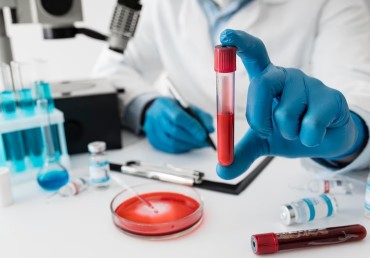Preventive Healthcare
ASO Titre Test: What It Is, Procedure, Preparation and Results
97792 Views
0

If you've been told you need an ASO Titre test, you might be wondering what exactly that is. This article will explain everything you need to know about the ASO Titre test, the procedure, preparation, and results.
The blood test used to detect strep infection is called the antistreptolysin O (ASO) titer test. Some illnesses caused by this bacteria are:
- Strep throat
- Scarlet fever
- Glomerulonephritis
- Rheumatic fever, which can affect the heart, joints, or bones
- Bacterial endocarditis is an infection of the inner lining of your heart
What is The ASO Titre Test?
Antistreptolysin O (ASO) is an antibody developed to fight the harmful enzyme streptolysin O produced by group A Streptococcus bacteria. A blood test called an antistreptolysin O (ASO) Titre measures antibodies against streptolysin O. Antibodies are proteins made by the body to protect it from invaders like bacteria and viruses. These antibodies are specific to the bacteria they need to fight. The ASO Titre Test measures the level of antibodies in the blood to determine if they are high enough to fight off an infection.
Why Do You Need The ASO Titre Test?
The ASO Titre test is a blood test that measures the level of antibodies in your blood. If you exhibit signs of a previous group A streptococcus infection, you will require the test. Even weeks or months after the strep infection has cleared up, the ASO antibody may still be present in the blood. The ASO Titre test is used to diagnose certain conditions and infections spreading to the throat, skin, middle ear, tonsils, sinuses, and blood that may get infected as a result. Most likely, an antibiotic will be used to treat and cure a strep infection. You could, however, experience subsequent issues if you don't experience any symptoms or if the condition is not fully treated. If your healthcare practitioner believes you may be experiencing one of the following problems, an ASO titre blood test may be necessary.
Bacterial endocarditis is an infection of the heart's inner lining due to bacteria or other pathogens getting into the bloodstream and going to the heart. The germs adhere to heart tissue or damaged heart valves. This potentially fatal inflammation of the inner lining of the heart's chambers and valves is known as endocarditis. There are a few signs such as:
- Chills or a fever
- Fatigue
- Cough
- Nausea
- Sweats during night
- Aching joints and muscles
- Breathing problems
Glomerulonephritis is a kidney condition when the kidneys' glomeruli (minuscule filters) are harmed. It may make it more difficult for your kidneys to eliminate fluid and waste from your body. Kidney failure can also happen in serious circumstances. The following symptoms can be present:
- Urine containing blood
- Tiredness
- Nausea and rashes
- High blood pressure
- Pain in joints or stomach
- Decreased or increased urination
- Swelling on the face or joints
Rheumatic fever: According to medical professionals, it is your body's immune reaction to a prior strep or scarlet fever infection. A deadly inflammatory disorder called rheumatic fever can harm your heart, joints, brain, skin, and joints. Rheumatic fever symptoms can include:
- Knees, ankles, elbows, and wrists have sore, achy joints.
- Fever
- Chest pain, breathlessness, and a rapid heartbeat are all cardiac symptoms.
- Tiredness
- Unexpected jerking
- Although uncommon, there may be lumps under the skin near the joints.
- Pink circles with clear centres are unusual, but there are some in the rash.
Scarlet fever affects children between the ages of five and fifteen and may have these symptoms, which are listed below:
- A skin rash that is red and looks like a sunburn
- Red lines around the neck, elbows, knees, armpits, and groin area
- A flushed face with a pale lip ring.
- Red and rough tongue with a coating of white
What is The Procedure for ASO Titre Test?
The procedure for ASO Titre Test is to get a blood sample from the patient, separate the blood cells from the liquid portion of the blood, and then incubate them with an antibody that will bind to a particular antigen.
Certain precautions required before this test are that you might need to skip food and liquids for six hours before the test. Before this test, your doctor could advise you to cease using a particular medicine.
ASO Titre Normal Range
The ASO Titre normal range is considered within 0-200 for adults and below 100 for children aged 5 years and less. A low titre may, under certain circumstances, represent the immune system's effective eradication of pathogenic microorganisms. A high titre, on the other hand, can be the result of lingering antibodies from an earlier infection or failed attempts to assemble antigen-antibody complexes. High ASO test results mean you got a streptococcus infection.
ASO Titre positive signs include the following symptoms:
- Fever and Fatigue
- Skin rashes
- Elevated blood pressure
- Swelling (oedema)
- Swelling and pain in joints
- Nodules under the skin that don't hurt
- Shortness of breath, chest pain, palpitations, and heart inflammation (carditis).
ASO Titre Positive Treatment
Increased ASO Titre levels in the blood may harm the heart and joints. Penicillin is typically used to treat patients with elevated ASO Titre levels.
Conclusion
In conclusion, there are many factors that could result from any of the conditions listed in the article with symptoms that can affect someone's titre levels. Therefore, it is important to understand your titre levels and know what to do next if you have high titre levels.























 WhatsApp
WhatsApp
